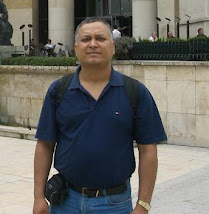Gurkhas are part of the British Army. Gurkhas have been part of the British Army for almost 200 years and has brave reputation for their skills, courage, honesty and loyalty in the war. "Better to die than be a coward" is the motto of the world-famous Nepalese Gurkha soldiers who are an integral part of the British Army. They still carry into battle their traditional weapon - an 18-inch long curved knife known as the kukri. In times past, it was said that once a kukri was drawn in battle, it had to "taste blood" - if not, its owner had to cut himself before returning it to its sheath. Now, the Gurkhas say, it is used mainly for cooking.
The potential of these warriors was first realised by the British at the height of their empire-building in the last century. Bravest of the brave, most generous of the generous, never had a country more faithful friends than you says Sir Ralph Turner MC, 3rd Queen Alexandra's Own Gurkha Rifles, 1931. After suffering heavy casualties in the invasion of Nepal, the British East India Company signed a hasty peace deal in 1815, which also allowed it to recruit from the ranks of the former enemy.
of the generous, never had a country more faithful friends than you says Sir Ralph Turner MC, 3rd Queen Alexandra's Own Gurkha Rifles, 1931. After suffering heavy casualties in the invasion of Nepal, the British East India Company signed a hasty peace deal in 1815, which also allowed it to recruit from the ranks of the former enemy.
Following the partition of India in 1947, an agreement between Nepal, India and Britain meant four Gurkha regiments from the Indian army were transferred to the British Army, eventually becoming the Gurkha Brigade. Since then, the Gurkhas have loyally fought for the British all over the world, winning 13 Victoria Crosses between them. More than 200,000 fought in the two world wars and in the past 50 years, they have served in Hong Kong, Malaysia, Borneo, Cyprus, the Falklands, Kosovo and Afghanistan.
Gurkhas with the emblem of the feared kukri behind them. They serve in a variety of roles, mainly in the infantry but with significant numbers of engineers, logisticians and signals specialists.
The potential of these warriors was first realised by the British at the height of their empire-building in the last century. Bravest of the brave, most generous
 of the generous, never had a country more faithful friends than you says Sir Ralph Turner MC, 3rd Queen Alexandra's Own Gurkha Rifles, 1931. After suffering heavy casualties in the invasion of Nepal, the British East India Company signed a hasty peace deal in 1815, which also allowed it to recruit from the ranks of the former enemy.
of the generous, never had a country more faithful friends than you says Sir Ralph Turner MC, 3rd Queen Alexandra's Own Gurkha Rifles, 1931. After suffering heavy casualties in the invasion of Nepal, the British East India Company signed a hasty peace deal in 1815, which also allowed it to recruit from the ranks of the former enemy.Following the partition of India in 1947, an agreement between Nepal, India and Britain meant four Gurkha regiments from the Indian army were transferred to the British Army, eventually becoming the Gurkha Brigade. Since then, the Gurkhas have loyally fought for the British all over the world, winning 13 Victoria Crosses between them. More than 200,000 fought in the two world wars and in the past 50 years, they have served in Hong Kong, Malaysia, Borneo, Cyprus, the Falklands, Kosovo and Afghanistan.
Gurkhas with the emblem of the feared kukri behind them. They serve in a variety of roles, mainly in the infantry but with significant numbers of engineers, logisticians and signals specialists.
They keep to their Nepalese customs and beliefs, and the brigade follow
 s religious festivals such as Dashain, in which - in Nepal, not the UK - goats and buffaloes are sacrificed. But their numbers have been sharply reduced from a World War II peak of 112,000 men, and now stand at about 3,500.
s religious festivals such as Dashain, in which - in Nepal, not the UK - goats and buffaloes are sacrificed. But their numbers have been sharply reduced from a World War II peak of 112,000 men, and now stand at about 3,500. "To fight against these Gurkha warriors are like fighting against their death" is the popular saying in many countries who has faced them during world war I and II and other wars.

When England invaded FALKLAND Island during 1980s, they spread the news to opponents "Argentinian" that the Gurkha warriors are coming to fight against them, those Gurkhas who has such a terrific and wonderful weapons they have, which will satisfy only by scissoring the chest of opponent. That is the tactic of British 
Government and Army to win the pshycological war
against the opponent. This magical weapon is nothing other than just the "Khukuri"
The Kukri or Khukuri (Devanāgar
Government and Army to win the pshycological war
against the opponent. This magical weapon is nothing other than just the "Khukuri"
 ī: खुकुरी) is a heavy, curved Nepalese knife used as both tool and weapon. It is also a part of the regimental weaponry and heraldry of Gurkha fighters. It is known to many people as simply the "Gurkha knife".
ī: खुकुरी) is a heavy, curved Nepalese knife used as both tool and weapon. It is also a part of the regimental weaponry and heraldry of Gurkha fighters. It is known to many people as simply the "Gurkha knife".


































1 comment:
yo brows
i was proud to be a gurkha but by readin ur beautifull blog i am now more proud to be a gurkha
Post a Comment